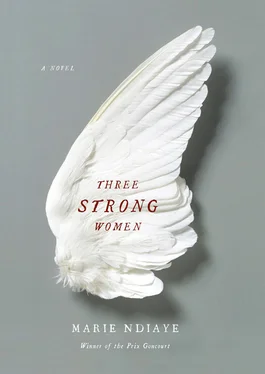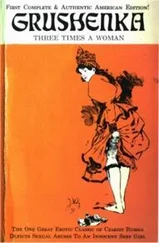And while she hoped to find in the earth being hollowed out under the weight of her enormous body the warmth that she thought would get her back on her feet, as soon as she closed her eyes she encountered an even greater cold, against which the bluish sun filtering through the plastic was of no effect, any more than was the humid, stuffy, and (to judge by her profuse sweating) probably warm air inside the tent under the trees.
Oh, she was certainly cold and every inch of her body was hurting, but she reflected with such intensity on how she might forget the cold and the pain that when she saw again in her mind’s eye the faces of her grandmother and of her husband — the two people who’d been good to her and had reinforced her in the view that her life, her person, had no less meaning and value than theirs — and when she wondered if the child she’d so longed to bear could have prevented her falling into such a wretched situation, she realized that these were only thoughts and not regrets, because she didn’t lament her present state, didn’t want to change it, and even found herself in a way delighted, not at her suffering but simply at her condition as a human being confronting as bravely as possible all sorts of perils.
She got better.
She could sit up and eat and drink normally.
A man and a woman who appeared to be living together under the tent gave her a little bread and some boiled wheat that they prepared outside on a log fire in an old saucepan without a handle.
Khady remembered that she’d traveled in the truck with them.
They were both taciturn, and besides had no language in common with Khady, beyond a few words of English; still, she grasped eventually that they had been trying for years to get to Europe and that the man had managed to live there for a while before being expelled.
They both had children somewhere whom they hadn’t seen in a long time.
The tent was part of a vast encampment of shacks or tarpaulins lofted on poles, and men in rags were moving among the trees, carrying branches or tin cans.
Khady’d noticed she had nothing anymore: no bundle, passport, or money.
Both the man and the woman spent their days making ladders. After watching for a while how they did it, Khady went in search of branches and worked in her turn at building a ladder, dredging up from memory a story she’d been told (by the nameless faceless boy of her thwarted ascension) about a wire fence separating Africa from Europe, and questioning in her new hoarse, rough voice the man and the woman, who replied with a few words that she didn’t always know but that, linked to others she had learned, or translated summarily by a sketch drawn on the ground, ended up corresponding fairly closely to what she’d gathered from the boy. The couple tossed in her direction bits of string, which they used to tie each rung of the ladder to the uprights. They did so reluctantly and with some annoyance, as if, Khady thought calmly, having robbed her of all she possessed, as she assumed they had, they could hardly refuse to help her however much they didn’t like it.
She left the forest with the woman, and they followed a tarmac road to the gates of a town.
She was limping badly and her damaged calf could be seen below the hem of her old batik.
They begged in the streets.
Khady held her hand out as the woman did.
In an incomprehensible language people hurled what must have been insults at them. Some spat at their feet. Others gave them bread.
Khady was so hungry she bit violently into the bread.
Her hands trembled.
Her gums were bleeding. They left traces of blood on the bread.
But her heart was beating gently, calmly, and she felt the same way: gentle and calm, beyond reach, shielded by her unshakable humanity.
A short time later barking, shouting, and the sound of people running echoed through the camp.
Soldiers were pulling down the shacks, tearing off tarpaulin covers, and scattering the stones where cooking fires had been lit.
One of them grabbed Khady and ripped her batik off.
She saw him hesitate and realized he was repulsed by her thin body and the blackish marks on her skin.
He punched her in the face and threw her on the ground, his mouth twisted in anger and disgust.
Later, much later, weeks and months later perhaps, with every night in the forest feeling colder than the last and the sun seeming every day to look paler and hang lower in the sky, the men who’d been elected — or who’d appointed themselves — as leaders of the camp announced that the assault on the fence would take place the day after next.
They set off at night, dozens and dozens of men and women among whom Khady felt particularly flimsy, almost impalpable, a mere puff of wind.
Like the others she was carrying a ladder, which, though light, seemed to weigh more than she did, just as things sometimes — absurdly — do in dreams, and yet, as her enormous heart beat within the little bony cage of her fragile, burning chest, she limped along no slower than her companions.
They walked for a long while in silence through the forest, then over stony fields where Khady stumbled and fell several times, but she picked herself up and returned to her place in the group, she who felt herself but an infinitesimal displacement of air, a glacial nuance of the atmosphere — so cold was she, so cold through and through.
They arrived at last in a deserted area bathed in a white light that resembled the brightness of the moon made incandescent, and Khady saw the fence they’d all been talking about.
As they moved forward dogs began barking and shots rang out. Khady heard a voice made strident and uneven by anxiety: “They’re firing in the air,” then the same person, perhaps, shouted the agreed-upon signal, a single word, and everyone began running toward the fence.
She ran too. Her mouth was wide open but she couldn’t breathe. Her eyes were staring and her throat was blocked. Already the fence was there and she leaned her ladder against it. Then, rung by rung, she climbed up until she reached the top and gripped the fence.
She could hear all around her shots being fired and cries of fear and pain. She couldn’t tell if she was shouting too, or if it was the sound of the blood throbbing in her skull, enveloping her in an endless threnody. She tried to go higher, remembering that a boy had told her you must never, never stop climbing until you’ve reached the top, but the barbed wire was tearing the skin off her hands and feet and she could now hear herself screaming and feel blood running along her shoulders and down her arms. She kept telling herself never to stop climbing, never, repeating the words over and over again while no longer understanding them, then giving up, letting go, falling slowly backward, and thinking then that the person of Khady Demba — less than a breath, scarcely a puff of air — was surely never to touch the ground, but would float eternal, priceless, too evanescent ever to be smashed in the cold, blinding glare of the floodlights.
COUNTERPOINT
EVERY TIME Lamine was paid for his work, in the kitchen at the back of the restaurant Au bec fin , where he was an evening dishwasher; at the warehouse where he unpacked goods for supermarkets; on a construction site or in the metro: wherever he went to sell his labor, every time euros passed from a foreigner’s hand into his own, he thought of the girl, he silently begged her to forgive him and not to haunt him with curses and poisoned dreams. In the room he shared with others he slept with his money under the pillow and dreamed of the girl. She was either protecting him or — on the contrary — wishing he was in the pit of hell. And when, on bright days, he raised his eyes and let the sun warm his face, it wasn’t unusual for the sky to cloud over suddenly for no obvious reason, and then he would talk to the girl and tell her softly what had become of him, he would give thanks to her, a bird would vanish in the distance.
Читать дальше












